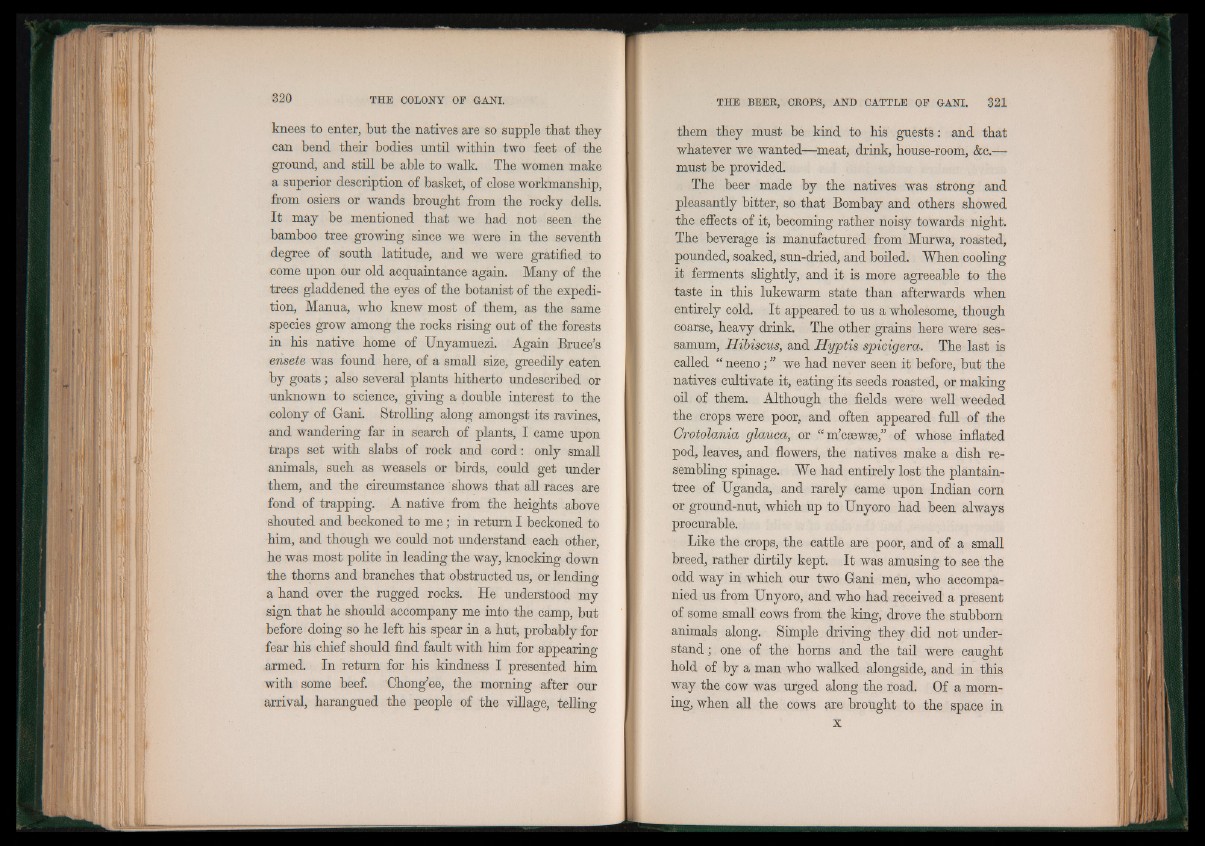
knees to enter, but the natives are so supple that they
can bend their bodies until within two feet of the
ground, and still be able to walk. The women make
a superior description of basket, of close workmanship,
from osiers or wands brought from the rocky dells.
It may be mentioned that we had not seen the
bamboo tree growing since we were in the seventh
degree of south latitude, and we were gratified to
come upon our old acquaintance again. Many of the
trees gladdened the eyes of the botanist of the expedition,
Manua, who knew most of them, as the same
species grow among the rocks rising out of the forests
in his native home of Unyamuezi. Again Bruce’s
ensete was found here, of a small size, greedily eaten
by goats; also several plants hitherto undescribed or
unknown to science, giving a double interest to the
colony of Gam. Strolling along amongst its ravines,
and wandering far in search of plants, I came upon
traps set with slabs of rock and cord: only small
animals, such as weasels or birds, could get under
them, and the circumstance shows that all races are
fond of trapping. A native from the heights above
shouted and beckoned to me; in return I beckoned to
him, and though we could not understand each other,
he was most polite in leading the way, knocking down
the thorns and branches that obstructed us, or lending
a hand over the rugged rocks. He understood my
sign that he should accompany me into the camp, but
before doing so he left his spear in a hut, probably for
fear his chief should find fault with him for appearing
armed. In return for his kindness I presented him
with some beef. Chong’ee, the morning after our
arrival, harangued the people of the village, telling
them they must be kind to his guests: and that
whatever we wanted—meat, drink, house-room, &c.—
must be provided.
The beer made by the natives was strong and
pleasantly bitter, so that Bombay and others showed
the effects of it, becoming rather noisy towards night.
The beverage is manufactured from Murwa, roasted,
pounded, soaked, sun-dried, and boiled. When cooling
it ferments slightly, and it is more agreeable to the
taste in this lukewarm state than afterwards when
entirely cold. It appeared to us a wholesome, though
coarse, heavy drink. The other grains here were ses-
samum, Hibiscus, and Hyptis spicigera. The last is
called “ neeno; ” we had never seen it before, but the
natives cultivate it, eating its seeds roasted, or making
oil of them. Although the fields were well weeded
the crops were poor, and often appeared full of the
Crotolania glauca, or “ m’csewee,” of whose inflated
pod, leaves, and flowers, the natives make a dish resembling
spinage. We had entirely lost the plantain-
tree of Uganda, and rarely came upon Indian com
or ground-nut, which up to Unyoro had been always
procurable.
Like the crops, the cattle are poor, and of a small
breed, rather dirtily kept. I t was amusing to see the
odd way in which our two Gani men, who accompanied
us from Unyoro, and who had received a present
of some small cows from the king, drove the stubborn
animals along. Simple driving they did not understand
| . one of the horns and the tail were caught
hold of by a man who walked alongside, and in this
way the cow was urged along the road. Of a morning,
when all the cows are brought to the space in
x